Impact of Social Factors: Gender, Ethnicity, Culture on Child Growth
VerifiedAdded on 2023/06/15
|12
|3074
|367
Essay
AI Summary
This essay examines the influence of gender, ethnicity, culture, and social class on children's experiences and development. It discusses how gender roles shape social norms, the impact of ethnicity on a child's identity and well-being, the role of culture in shaping behaviors and values, and how social class affects opportunities and parenting styles. The essay also highlights the role of early years educators in promoting equality, cultural understanding, and addressing social inequalities in children's lives. The conclusion emphasizes the importance of respecting diverse cultural differences and fostering a supportive environment for children's holistic development and Desklib provides access to similar essays and study tools for students.
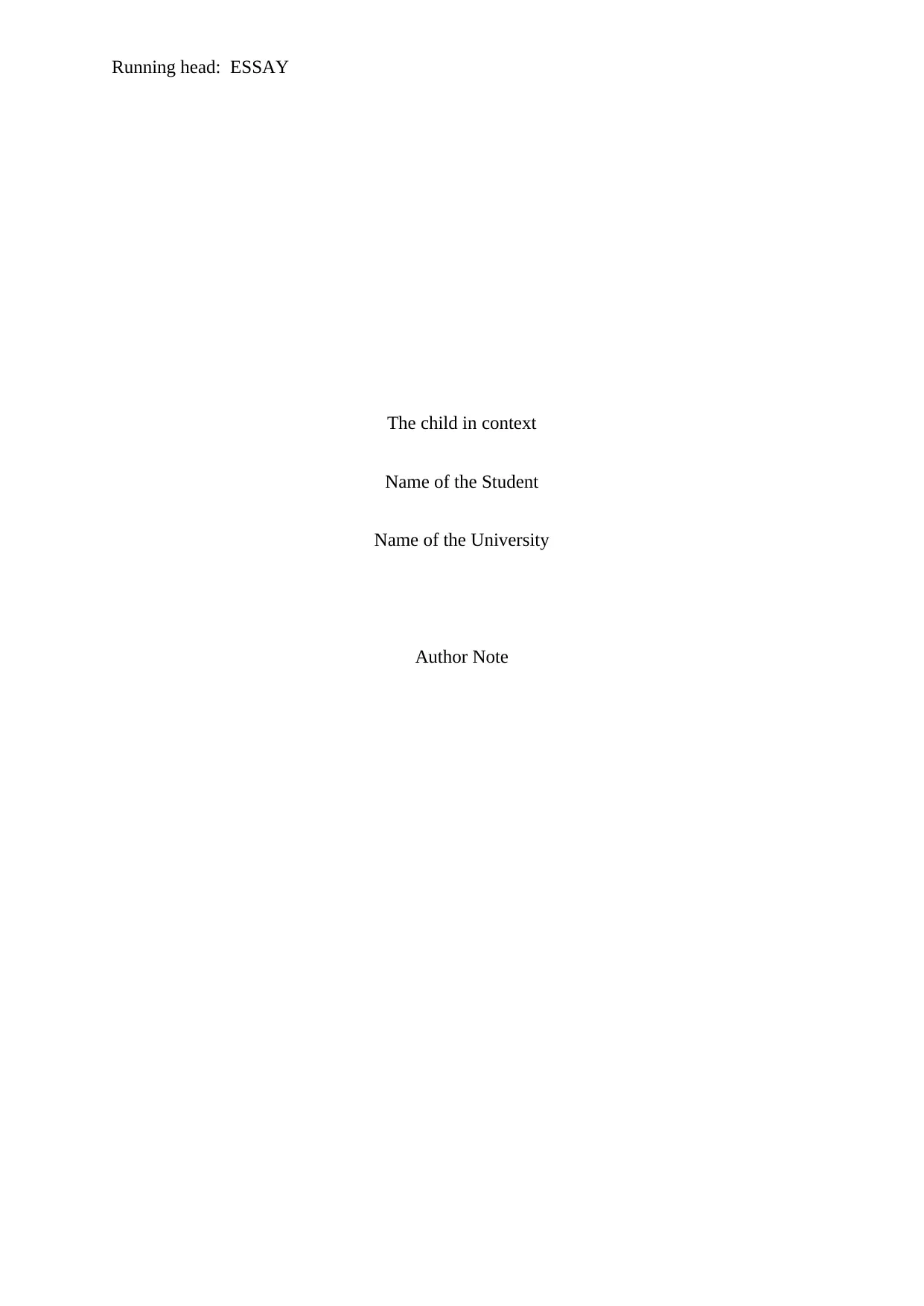
Running head: ESSAY
The child in context
Name of the Student
Name of the University
Author Note
The child in context
Name of the Student
Name of the University
Author Note
Paraphrase This Document
Need a fresh take? Get an instant paraphrase of this document with our AI Paraphraser
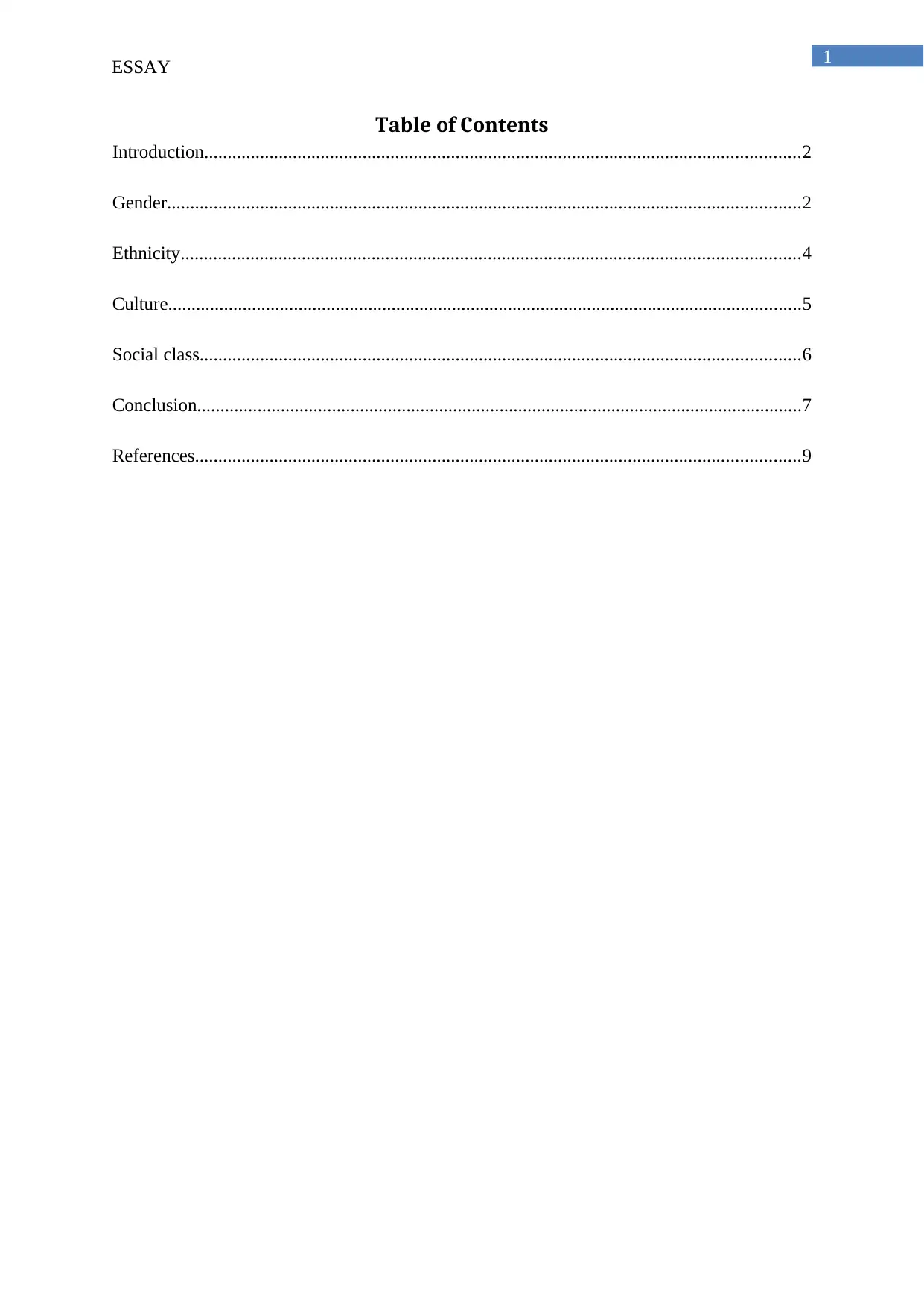
1
ESSAY
Table of Contents
Introduction................................................................................................................................2
Gender........................................................................................................................................2
Ethnicity.....................................................................................................................................4
Culture........................................................................................................................................5
Social class.................................................................................................................................6
Conclusion..................................................................................................................................7
References..................................................................................................................................9
ESSAY
Table of Contents
Introduction................................................................................................................................2
Gender........................................................................................................................................2
Ethnicity.....................................................................................................................................4
Culture........................................................................................................................................5
Social class.................................................................................................................................6
Conclusion..................................................................................................................................7
References..................................................................................................................................9
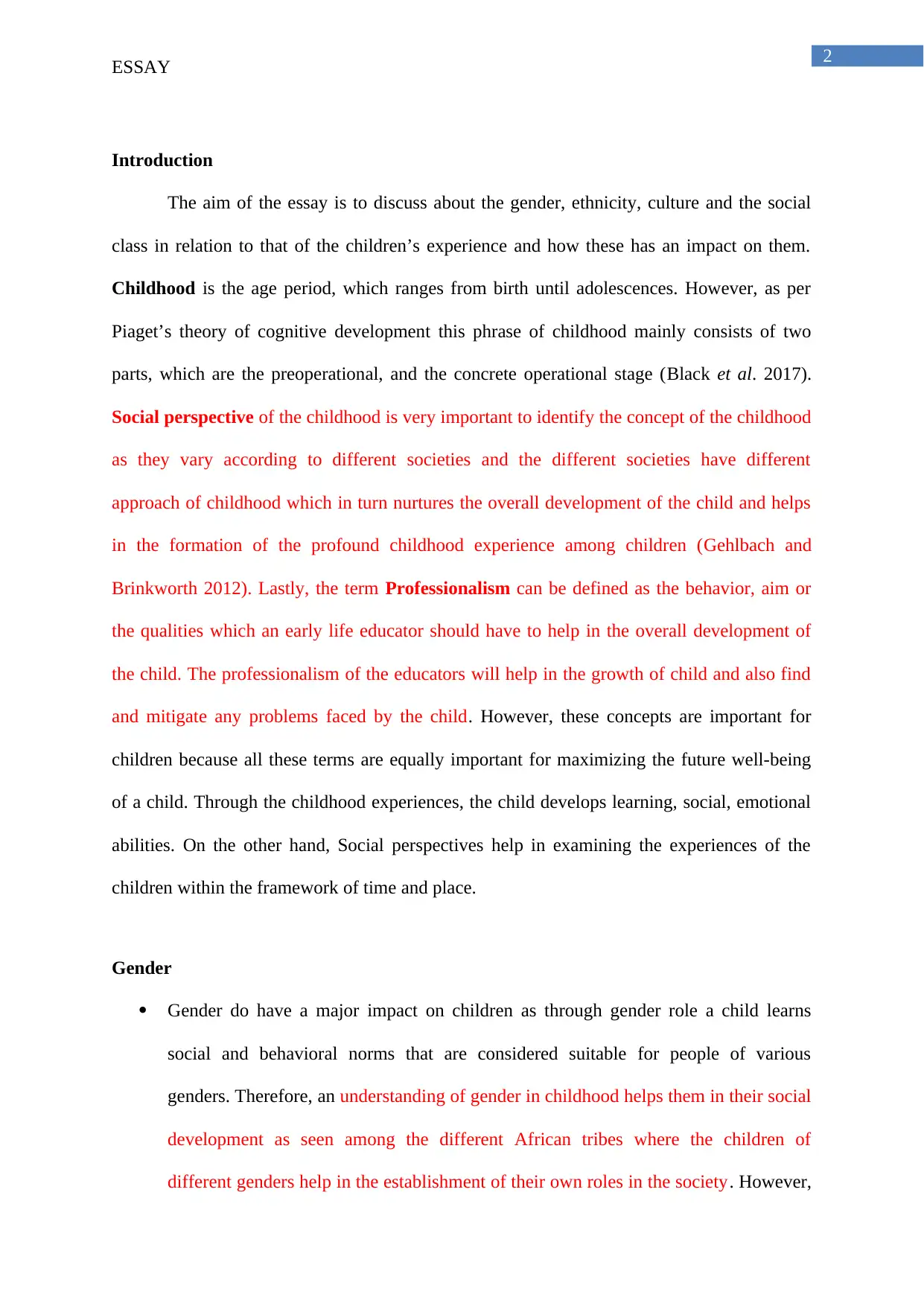
2
ESSAY
Introduction
The aim of the essay is to discuss about the gender, ethnicity, culture and the social
class in relation to that of the children’s experience and how these has an impact on them.
Childhood is the age period, which ranges from birth until adolescences. However, as per
Piaget’s theory of cognitive development this phrase of childhood mainly consists of two
parts, which are the preoperational, and the concrete operational stage (Black et al. 2017).
Social perspective of the childhood is very important to identify the concept of the childhood
as they vary according to different societies and the different societies have different
approach of childhood which in turn nurtures the overall development of the child and helps
in the formation of the profound childhood experience among children (Gehlbach and
Brinkworth 2012). Lastly, the term Professionalism can be defined as the behavior, aim or
the qualities which an early life educator should have to help in the overall development of
the child. The professionalism of the educators will help in the growth of child and also find
and mitigate any problems faced by the child. However, these concepts are important for
children because all these terms are equally important for maximizing the future well-being
of a child. Through the childhood experiences, the child develops learning, social, emotional
abilities. On the other hand, Social perspectives help in examining the experiences of the
children within the framework of time and place.
Gender
Gender do have a major impact on children as through gender role a child learns
social and behavioral norms that are considered suitable for people of various
genders. Therefore, an understanding of gender in childhood helps them in their social
development as seen among the different African tribes where the children of
different genders help in the establishment of their own roles in the society. However,
ESSAY
Introduction
The aim of the essay is to discuss about the gender, ethnicity, culture and the social
class in relation to that of the children’s experience and how these has an impact on them.
Childhood is the age period, which ranges from birth until adolescences. However, as per
Piaget’s theory of cognitive development this phrase of childhood mainly consists of two
parts, which are the preoperational, and the concrete operational stage (Black et al. 2017).
Social perspective of the childhood is very important to identify the concept of the childhood
as they vary according to different societies and the different societies have different
approach of childhood which in turn nurtures the overall development of the child and helps
in the formation of the profound childhood experience among children (Gehlbach and
Brinkworth 2012). Lastly, the term Professionalism can be defined as the behavior, aim or
the qualities which an early life educator should have to help in the overall development of
the child. The professionalism of the educators will help in the growth of child and also find
and mitigate any problems faced by the child. However, these concepts are important for
children because all these terms are equally important for maximizing the future well-being
of a child. Through the childhood experiences, the child develops learning, social, emotional
abilities. On the other hand, Social perspectives help in examining the experiences of the
children within the framework of time and place.
Gender
Gender do have a major impact on children as through gender role a child learns
social and behavioral norms that are considered suitable for people of various
genders. Therefore, an understanding of gender in childhood helps them in their social
development as seen among the different African tribes where the children of
different genders help in the establishment of their own roles in the society. However,
⊘ This is a preview!⊘
Do you want full access?
Subscribe today to unlock all pages.

Trusted by 1+ million students worldwide
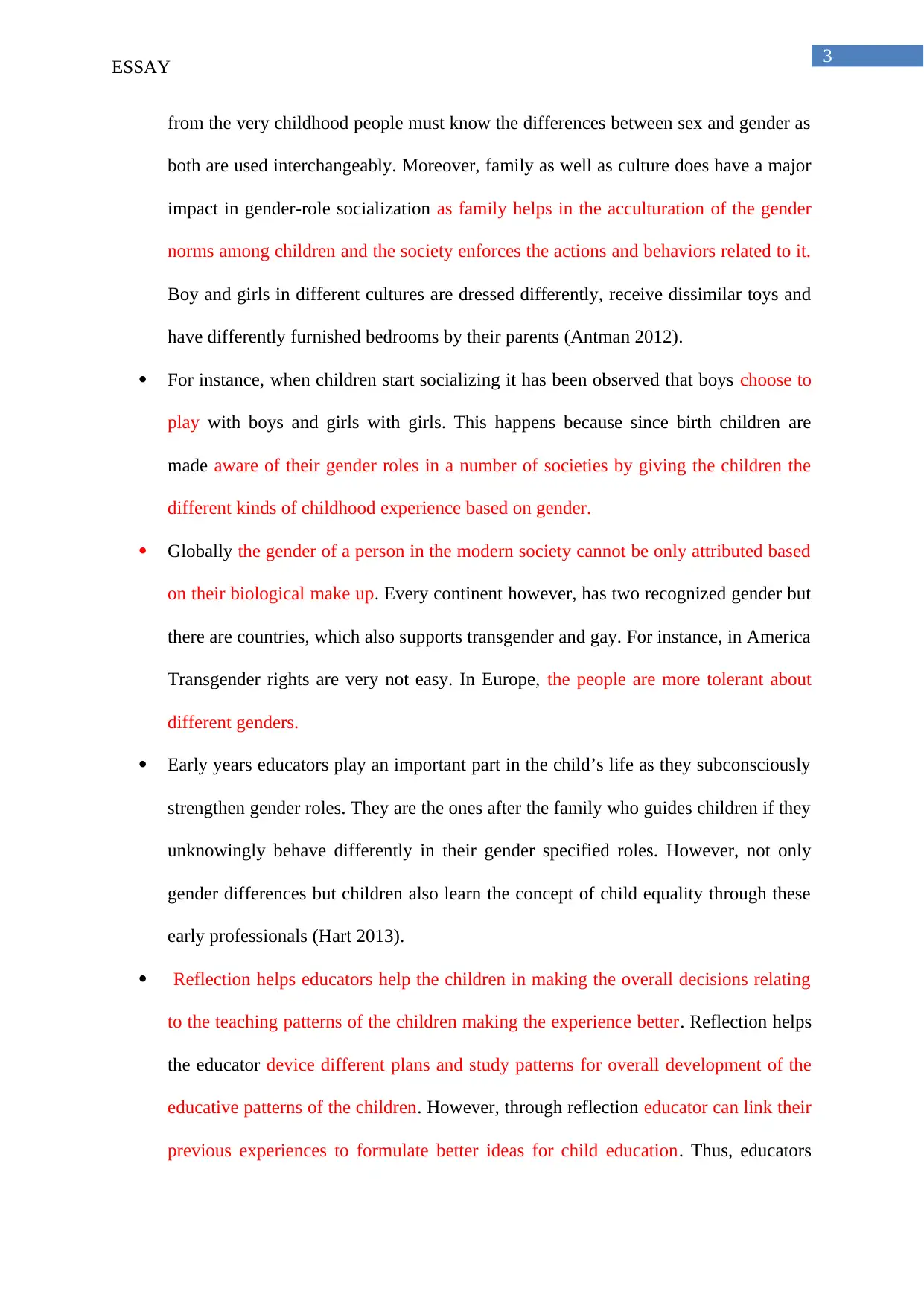
3
ESSAY
from the very childhood people must know the differences between sex and gender as
both are used interchangeably. Moreover, family as well as culture does have a major
impact in gender-role socialization as family helps in the acculturation of the gender
norms among children and the society enforces the actions and behaviors related to it.
Boy and girls in different cultures are dressed differently, receive dissimilar toys and
have differently furnished bedrooms by their parents (Antman 2012).
For instance, when children start socializing it has been observed that boys choose to
play with boys and girls with girls. This happens because since birth children are
made aware of their gender roles in a number of societies by giving the children the
different kinds of childhood experience based on gender.
Globally the gender of a person in the modern society cannot be only attributed based
on their biological make up. Every continent however, has two recognized gender but
there are countries, which also supports transgender and gay. For instance, in America
Transgender rights are very not easy. In Europe, the people are more tolerant about
different genders.
Early years educators play an important part in the child’s life as they subconsciously
strengthen gender roles. They are the ones after the family who guides children if they
unknowingly behave differently in their gender specified roles. However, not only
gender differences but children also learn the concept of child equality through these
early professionals (Hart 2013).
Reflection helps educators help the children in making the overall decisions relating
to the teaching patterns of the children making the experience better. Reflection helps
the educator device different plans and study patterns for overall development of the
educative patterns of the children. However, through reflection educator can link their
previous experiences to formulate better ideas for child education. Thus, educators
ESSAY
from the very childhood people must know the differences between sex and gender as
both are used interchangeably. Moreover, family as well as culture does have a major
impact in gender-role socialization as family helps in the acculturation of the gender
norms among children and the society enforces the actions and behaviors related to it.
Boy and girls in different cultures are dressed differently, receive dissimilar toys and
have differently furnished bedrooms by their parents (Antman 2012).
For instance, when children start socializing it has been observed that boys choose to
play with boys and girls with girls. This happens because since birth children are
made aware of their gender roles in a number of societies by giving the children the
different kinds of childhood experience based on gender.
Globally the gender of a person in the modern society cannot be only attributed based
on their biological make up. Every continent however, has two recognized gender but
there are countries, which also supports transgender and gay. For instance, in America
Transgender rights are very not easy. In Europe, the people are more tolerant about
different genders.
Early years educators play an important part in the child’s life as they subconsciously
strengthen gender roles. They are the ones after the family who guides children if they
unknowingly behave differently in their gender specified roles. However, not only
gender differences but children also learn the concept of child equality through these
early professionals (Hart 2013).
Reflection helps educators help the children in making the overall decisions relating
to the teaching patterns of the children making the experience better. Reflection helps
the educator device different plans and study patterns for overall development of the
educative patterns of the children. However, through reflection educator can link their
previous experiences to formulate better ideas for child education. Thus, educators
Paraphrase This Document
Need a fresh take? Get an instant paraphrase of this document with our AI Paraphraser
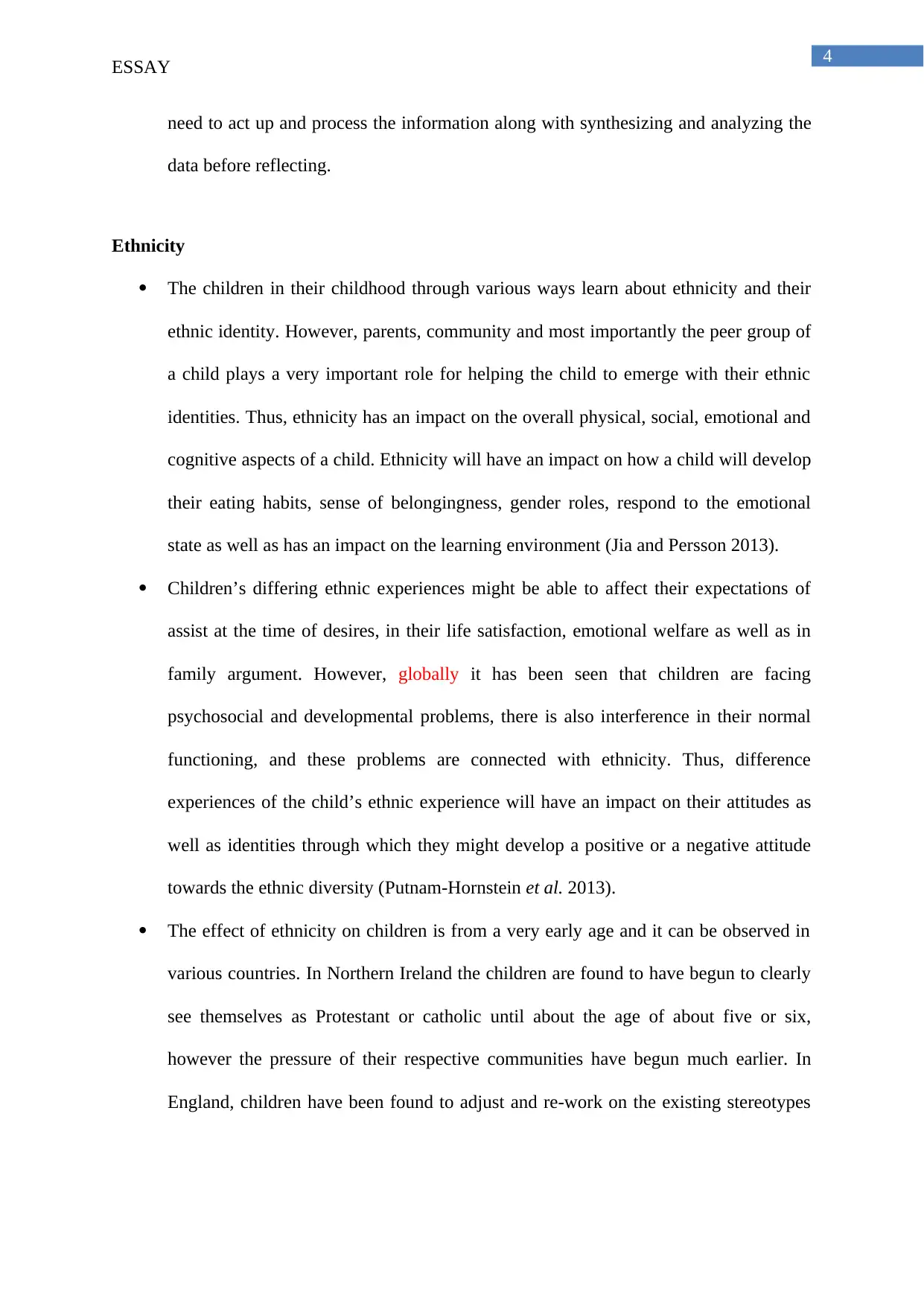
4
ESSAY
need to act up and process the information along with synthesizing and analyzing the
data before reflecting.
Ethnicity
The children in their childhood through various ways learn about ethnicity and their
ethnic identity. However, parents, community and most importantly the peer group of
a child plays a very important role for helping the child to emerge with their ethnic
identities. Thus, ethnicity has an impact on the overall physical, social, emotional and
cognitive aspects of a child. Ethnicity will have an impact on how a child will develop
their eating habits, sense of belongingness, gender roles, respond to the emotional
state as well as has an impact on the learning environment (Jia and Persson 2013).
Children’s differing ethnic experiences might be able to affect their expectations of
assist at the time of desires, in their life satisfaction, emotional welfare as well as in
family argument. However, globally it has been seen that children are facing
psychosocial and developmental problems, there is also interference in their normal
functioning, and these problems are connected with ethnicity. Thus, difference
experiences of the child’s ethnic experience will have an impact on their attitudes as
well as identities through which they might develop a positive or a negative attitude
towards the ethnic diversity (Putnam-Hornstein et al. 2013).
The effect of ethnicity on children is from a very early age and it can be observed in
various countries. In Northern Ireland the children are found to have begun to clearly
see themselves as Protestant or catholic until about the age of about five or six,
however the pressure of their respective communities have begun much earlier. In
England, children have been found to adjust and re-work on the existing stereotypes
ESSAY
need to act up and process the information along with synthesizing and analyzing the
data before reflecting.
Ethnicity
The children in their childhood through various ways learn about ethnicity and their
ethnic identity. However, parents, community and most importantly the peer group of
a child plays a very important role for helping the child to emerge with their ethnic
identities. Thus, ethnicity has an impact on the overall physical, social, emotional and
cognitive aspects of a child. Ethnicity will have an impact on how a child will develop
their eating habits, sense of belongingness, gender roles, respond to the emotional
state as well as has an impact on the learning environment (Jia and Persson 2013).
Children’s differing ethnic experiences might be able to affect their expectations of
assist at the time of desires, in their life satisfaction, emotional welfare as well as in
family argument. However, globally it has been seen that children are facing
psychosocial and developmental problems, there is also interference in their normal
functioning, and these problems are connected with ethnicity. Thus, difference
experiences of the child’s ethnic experience will have an impact on their attitudes as
well as identities through which they might develop a positive or a negative attitude
towards the ethnic diversity (Putnam-Hornstein et al. 2013).
The effect of ethnicity on children is from a very early age and it can be observed in
various countries. In Northern Ireland the children are found to have begun to clearly
see themselves as Protestant or catholic until about the age of about five or six,
however the pressure of their respective communities have begun much earlier. In
England, children have been found to adjust and re-work on the existing stereotypes
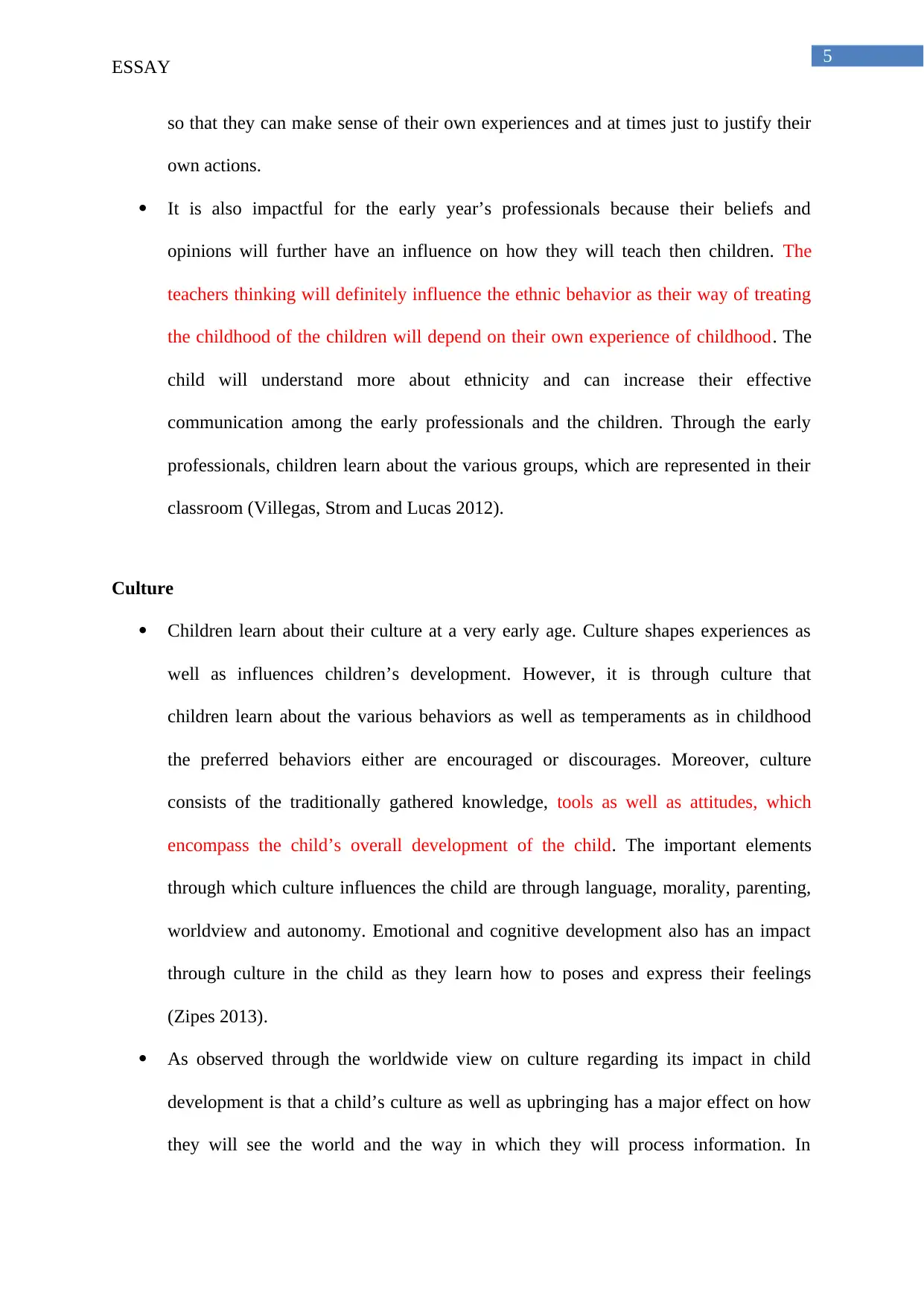
5
ESSAY
so that they can make sense of their own experiences and at times just to justify their
own actions.
It is also impactful for the early year’s professionals because their beliefs and
opinions will further have an influence on how they will teach then children. The
teachers thinking will definitely influence the ethnic behavior as their way of treating
the childhood of the children will depend on their own experience of childhood. The
child will understand more about ethnicity and can increase their effective
communication among the early professionals and the children. Through the early
professionals, children learn about the various groups, which are represented in their
classroom (Villegas, Strom and Lucas 2012).
Culture
Children learn about their culture at a very early age. Culture shapes experiences as
well as influences children’s development. However, it is through culture that
children learn about the various behaviors as well as temperaments as in childhood
the preferred behaviors either are encouraged or discourages. Moreover, culture
consists of the traditionally gathered knowledge, tools as well as attitudes, which
encompass the child’s overall development of the child. The important elements
through which culture influences the child are through language, morality, parenting,
worldview and autonomy. Emotional and cognitive development also has an impact
through culture in the child as they learn how to poses and express their feelings
(Zipes 2013).
As observed through the worldwide view on culture regarding its impact in child
development is that a child’s culture as well as upbringing has a major effect on how
they will see the world and the way in which they will process information. In
ESSAY
so that they can make sense of their own experiences and at times just to justify their
own actions.
It is also impactful for the early year’s professionals because their beliefs and
opinions will further have an influence on how they will teach then children. The
teachers thinking will definitely influence the ethnic behavior as their way of treating
the childhood of the children will depend on their own experience of childhood. The
child will understand more about ethnicity and can increase their effective
communication among the early professionals and the children. Through the early
professionals, children learn about the various groups, which are represented in their
classroom (Villegas, Strom and Lucas 2012).
Culture
Children learn about their culture at a very early age. Culture shapes experiences as
well as influences children’s development. However, it is through culture that
children learn about the various behaviors as well as temperaments as in childhood
the preferred behaviors either are encouraged or discourages. Moreover, culture
consists of the traditionally gathered knowledge, tools as well as attitudes, which
encompass the child’s overall development of the child. The important elements
through which culture influences the child are through language, morality, parenting,
worldview and autonomy. Emotional and cognitive development also has an impact
through culture in the child as they learn how to poses and express their feelings
(Zipes 2013).
As observed through the worldwide view on culture regarding its impact in child
development is that a child’s culture as well as upbringing has a major effect on how
they will see the world and the way in which they will process information. In
⊘ This is a preview!⊘
Do you want full access?
Subscribe today to unlock all pages.

Trusted by 1+ million students worldwide
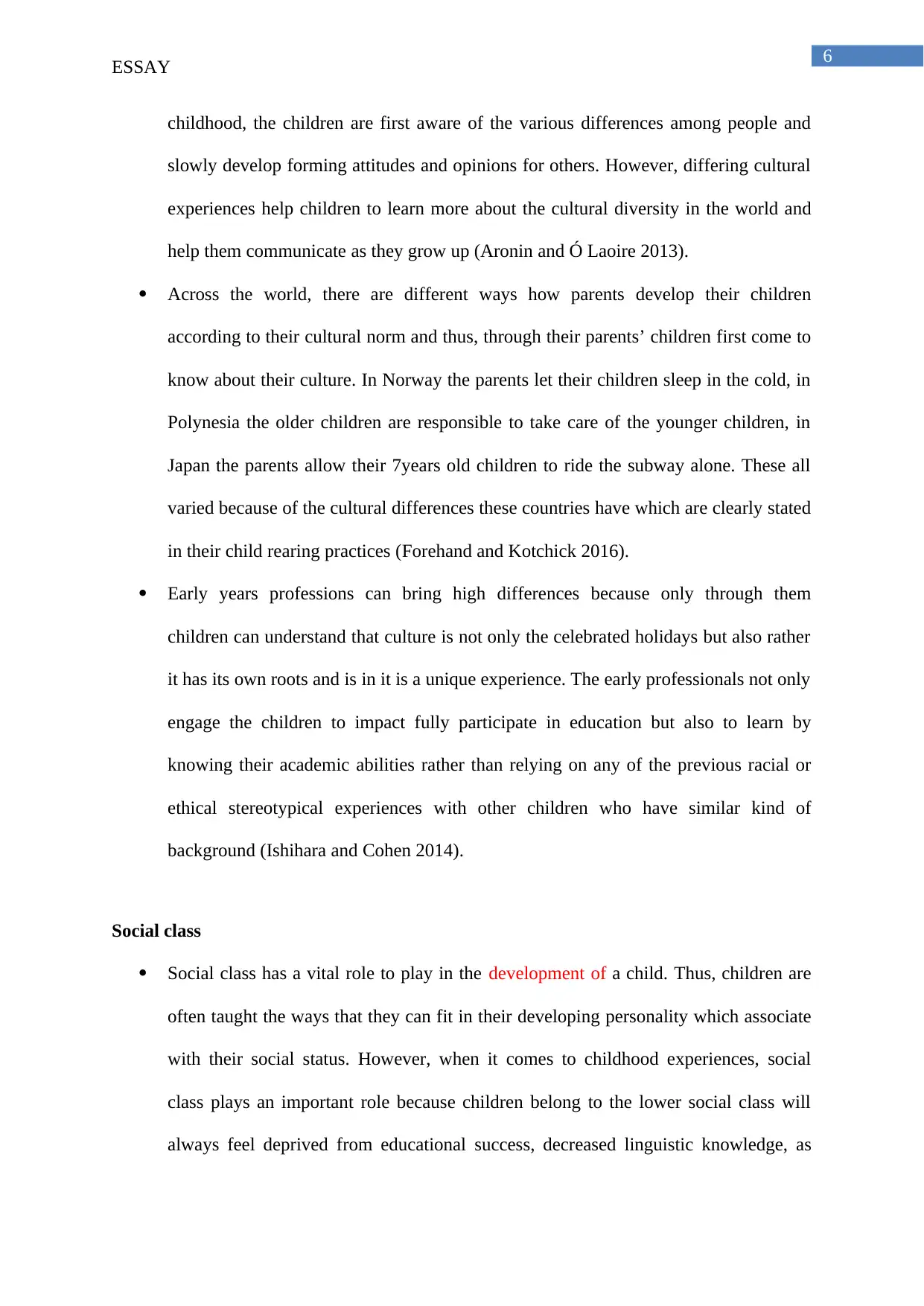
6
ESSAY
childhood, the children are first aware of the various differences among people and
slowly develop forming attitudes and opinions for others. However, differing cultural
experiences help children to learn more about the cultural diversity in the world and
help them communicate as they grow up (Aronin and Ó Laoire 2013).
Across the world, there are different ways how parents develop their children
according to their cultural norm and thus, through their parents’ children first come to
know about their culture. In Norway the parents let their children sleep in the cold, in
Polynesia the older children are responsible to take care of the younger children, in
Japan the parents allow their 7years old children to ride the subway alone. These all
varied because of the cultural differences these countries have which are clearly stated
in their child rearing practices (Forehand and Kotchick 2016).
Early years professions can bring high differences because only through them
children can understand that culture is not only the celebrated holidays but also rather
it has its own roots and is in it is a unique experience. The early professionals not only
engage the children to impact fully participate in education but also to learn by
knowing their academic abilities rather than relying on any of the previous racial or
ethical stereotypical experiences with other children who have similar kind of
background (Ishihara and Cohen 2014).
Social class
Social class has a vital role to play in the development of a child. Thus, children are
often taught the ways that they can fit in their developing personality which associate
with their social status. However, when it comes to childhood experiences, social
class plays an important role because children belong to the lower social class will
always feel deprived from educational success, decreased linguistic knowledge, as
ESSAY
childhood, the children are first aware of the various differences among people and
slowly develop forming attitudes and opinions for others. However, differing cultural
experiences help children to learn more about the cultural diversity in the world and
help them communicate as they grow up (Aronin and Ó Laoire 2013).
Across the world, there are different ways how parents develop their children
according to their cultural norm and thus, through their parents’ children first come to
know about their culture. In Norway the parents let their children sleep in the cold, in
Polynesia the older children are responsible to take care of the younger children, in
Japan the parents allow their 7years old children to ride the subway alone. These all
varied because of the cultural differences these countries have which are clearly stated
in their child rearing practices (Forehand and Kotchick 2016).
Early years professions can bring high differences because only through them
children can understand that culture is not only the celebrated holidays but also rather
it has its own roots and is in it is a unique experience. The early professionals not only
engage the children to impact fully participate in education but also to learn by
knowing their academic abilities rather than relying on any of the previous racial or
ethical stereotypical experiences with other children who have similar kind of
background (Ishihara and Cohen 2014).
Social class
Social class has a vital role to play in the development of a child. Thus, children are
often taught the ways that they can fit in their developing personality which associate
with their social status. However, when it comes to childhood experiences, social
class plays an important role because children belong to the lower social class will
always feel deprived from educational success, decreased linguistic knowledge, as
Paraphrase This Document
Need a fresh take? Get an instant paraphrase of this document with our AI Paraphraser
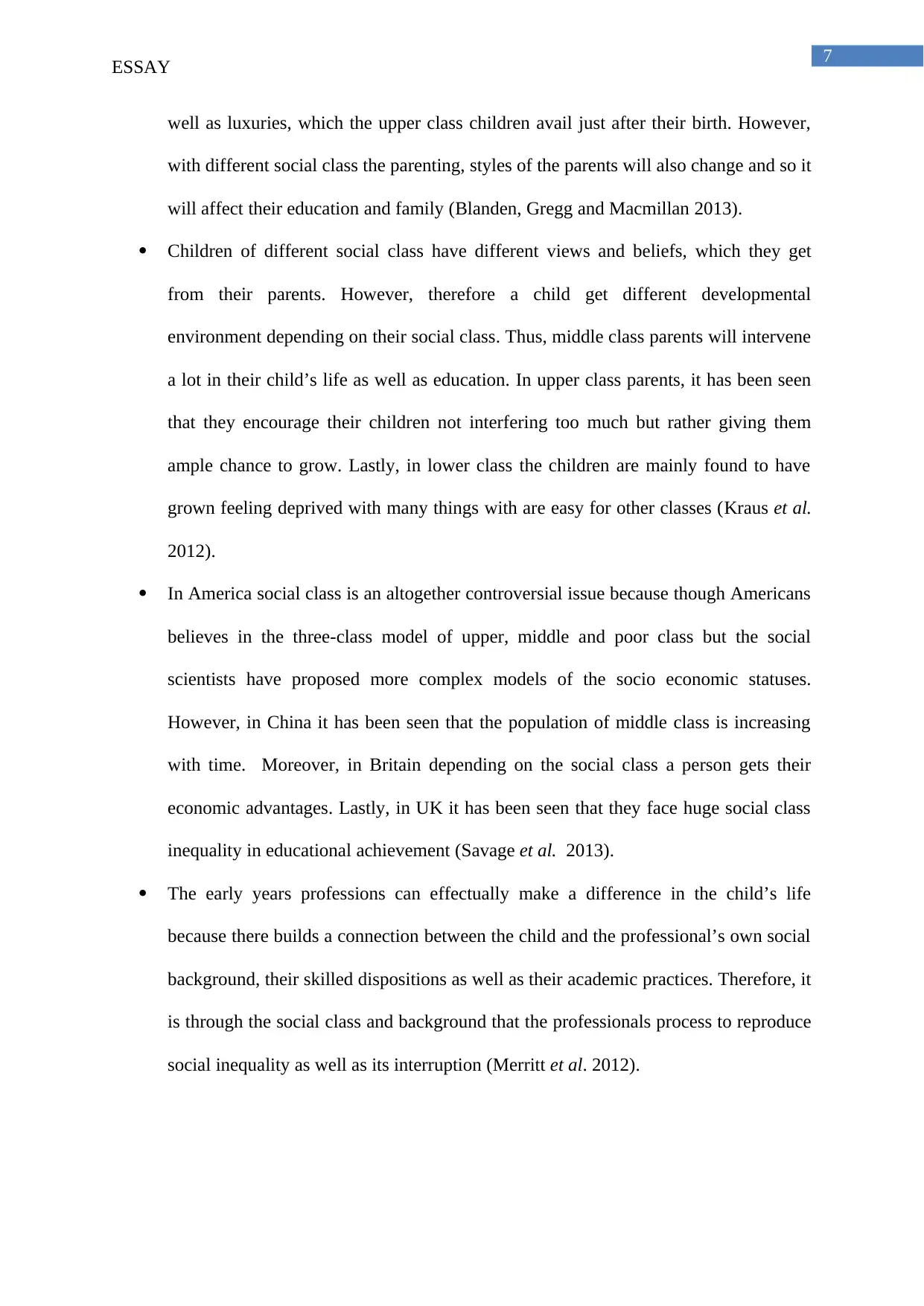
7
ESSAY
well as luxuries, which the upper class children avail just after their birth. However,
with different social class the parenting, styles of the parents will also change and so it
will affect their education and family (Blanden, Gregg and Macmillan 2013).
Children of different social class have different views and beliefs, which they get
from their parents. However, therefore a child get different developmental
environment depending on their social class. Thus, middle class parents will intervene
a lot in their child’s life as well as education. In upper class parents, it has been seen
that they encourage their children not interfering too much but rather giving them
ample chance to grow. Lastly, in lower class the children are mainly found to have
grown feeling deprived with many things with are easy for other classes (Kraus et al.
2012).
In America social class is an altogether controversial issue because though Americans
believes in the three-class model of upper, middle and poor class but the social
scientists have proposed more complex models of the socio economic statuses.
However, in China it has been seen that the population of middle class is increasing
with time. Moreover, in Britain depending on the social class a person gets their
economic advantages. Lastly, in UK it has been seen that they face huge social class
inequality in educational achievement (Savage et al. 2013).
The early years professions can effectually make a difference in the child’s life
because there builds a connection between the child and the professional’s own social
background, their skilled dispositions as well as their academic practices. Therefore, it
is through the social class and background that the professionals process to reproduce
social inequality as well as its interruption (Merritt et al. 2012).
ESSAY
well as luxuries, which the upper class children avail just after their birth. However,
with different social class the parenting, styles of the parents will also change and so it
will affect their education and family (Blanden, Gregg and Macmillan 2013).
Children of different social class have different views and beliefs, which they get
from their parents. However, therefore a child get different developmental
environment depending on their social class. Thus, middle class parents will intervene
a lot in their child’s life as well as education. In upper class parents, it has been seen
that they encourage their children not interfering too much but rather giving them
ample chance to grow. Lastly, in lower class the children are mainly found to have
grown feeling deprived with many things with are easy for other classes (Kraus et al.
2012).
In America social class is an altogether controversial issue because though Americans
believes in the three-class model of upper, middle and poor class but the social
scientists have proposed more complex models of the socio economic statuses.
However, in China it has been seen that the population of middle class is increasing
with time. Moreover, in Britain depending on the social class a person gets their
economic advantages. Lastly, in UK it has been seen that they face huge social class
inequality in educational achievement (Savage et al. 2013).
The early years professions can effectually make a difference in the child’s life
because there builds a connection between the child and the professional’s own social
background, their skilled dispositions as well as their academic practices. Therefore, it
is through the social class and background that the professionals process to reproduce
social inequality as well as its interruption (Merritt et al. 2012).
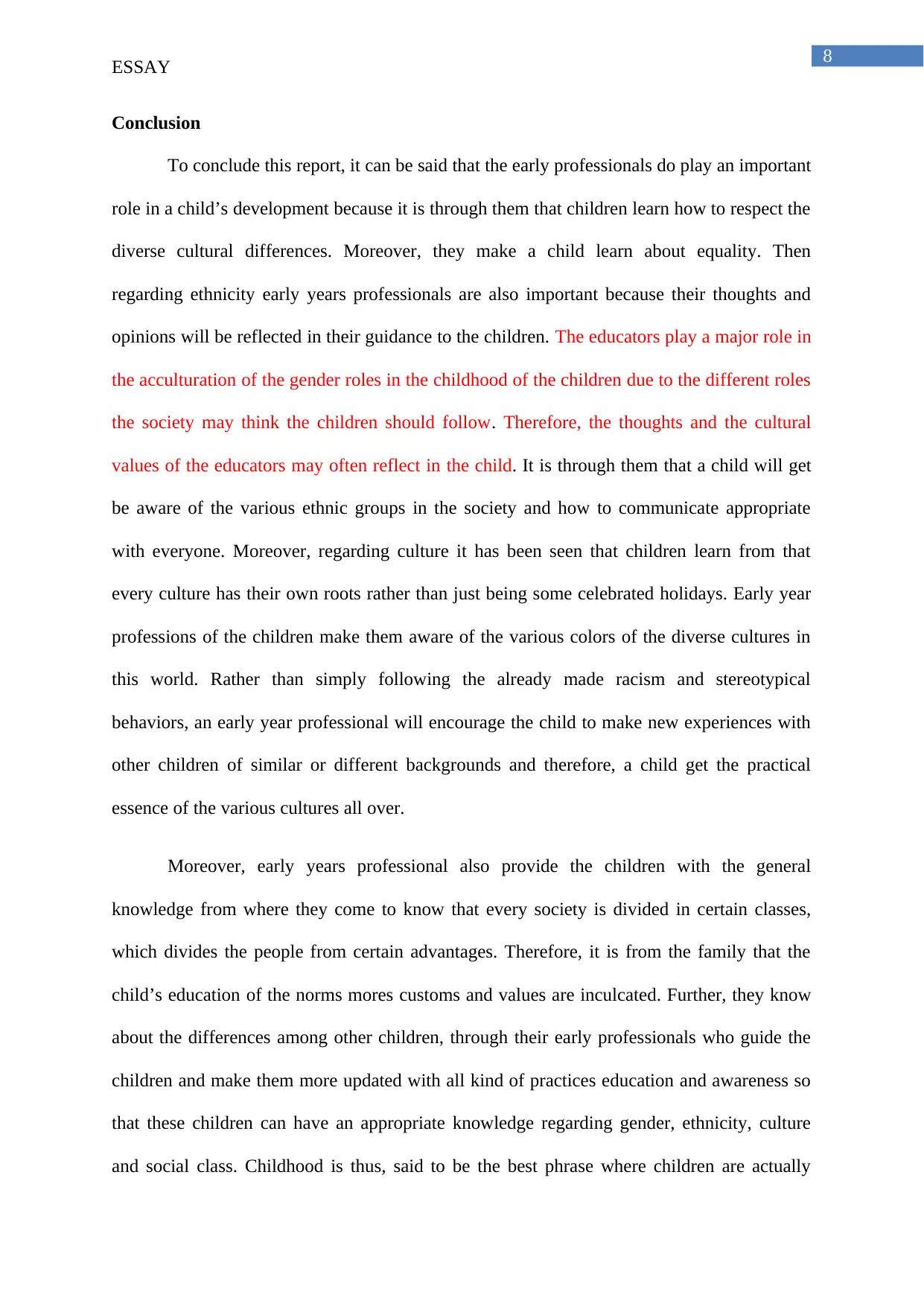
8
ESSAY
Conclusion
To conclude this report, it can be said that the early professionals do play an important
role in a child’s development because it is through them that children learn how to respect the
diverse cultural differences. Moreover, they make a child learn about equality. Then
regarding ethnicity early years professionals are also important because their thoughts and
opinions will be reflected in their guidance to the children. The educators play a major role in
the acculturation of the gender roles in the childhood of the children due to the different roles
the society may think the children should follow. Therefore, the thoughts and the cultural
values of the educators may often reflect in the child. It is through them that a child will get
be aware of the various ethnic groups in the society and how to communicate appropriate
with everyone. Moreover, regarding culture it has been seen that children learn from that
every culture has their own roots rather than just being some celebrated holidays. Early year
professions of the children make them aware of the various colors of the diverse cultures in
this world. Rather than simply following the already made racism and stereotypical
behaviors, an early year professional will encourage the child to make new experiences with
other children of similar or different backgrounds and therefore, a child get the practical
essence of the various cultures all over.
Moreover, early years professional also provide the children with the general
knowledge from where they come to know that every society is divided in certain classes,
which divides the people from certain advantages. Therefore, it is from the family that the
child’s education of the norms mores customs and values are inculcated. Further, they know
about the differences among other children, through their early professionals who guide the
children and make them more updated with all kind of practices education and awareness so
that these children can have an appropriate knowledge regarding gender, ethnicity, culture
and social class. Childhood is thus, said to be the best phrase where children are actually
ESSAY
Conclusion
To conclude this report, it can be said that the early professionals do play an important
role in a child’s development because it is through them that children learn how to respect the
diverse cultural differences. Moreover, they make a child learn about equality. Then
regarding ethnicity early years professionals are also important because their thoughts and
opinions will be reflected in their guidance to the children. The educators play a major role in
the acculturation of the gender roles in the childhood of the children due to the different roles
the society may think the children should follow. Therefore, the thoughts and the cultural
values of the educators may often reflect in the child. It is through them that a child will get
be aware of the various ethnic groups in the society and how to communicate appropriate
with everyone. Moreover, regarding culture it has been seen that children learn from that
every culture has their own roots rather than just being some celebrated holidays. Early year
professions of the children make them aware of the various colors of the diverse cultures in
this world. Rather than simply following the already made racism and stereotypical
behaviors, an early year professional will encourage the child to make new experiences with
other children of similar or different backgrounds and therefore, a child get the practical
essence of the various cultures all over.
Moreover, early years professional also provide the children with the general
knowledge from where they come to know that every society is divided in certain classes,
which divides the people from certain advantages. Therefore, it is from the family that the
child’s education of the norms mores customs and values are inculcated. Further, they know
about the differences among other children, through their early professionals who guide the
children and make them more updated with all kind of practices education and awareness so
that these children can have an appropriate knowledge regarding gender, ethnicity, culture
and social class. Childhood is thus, said to be the best phrase where children are actually
⊘ This is a preview!⊘
Do you want full access?
Subscribe today to unlock all pages.

Trusted by 1+ million students worldwide

9
ESSAY
shaped with the right values and education so that they can become a successful human being
when they grow up.
ESSAY
shaped with the right values and education so that they can become a successful human being
when they grow up.
Paraphrase This Document
Need a fresh take? Get an instant paraphrase of this document with our AI Paraphraser
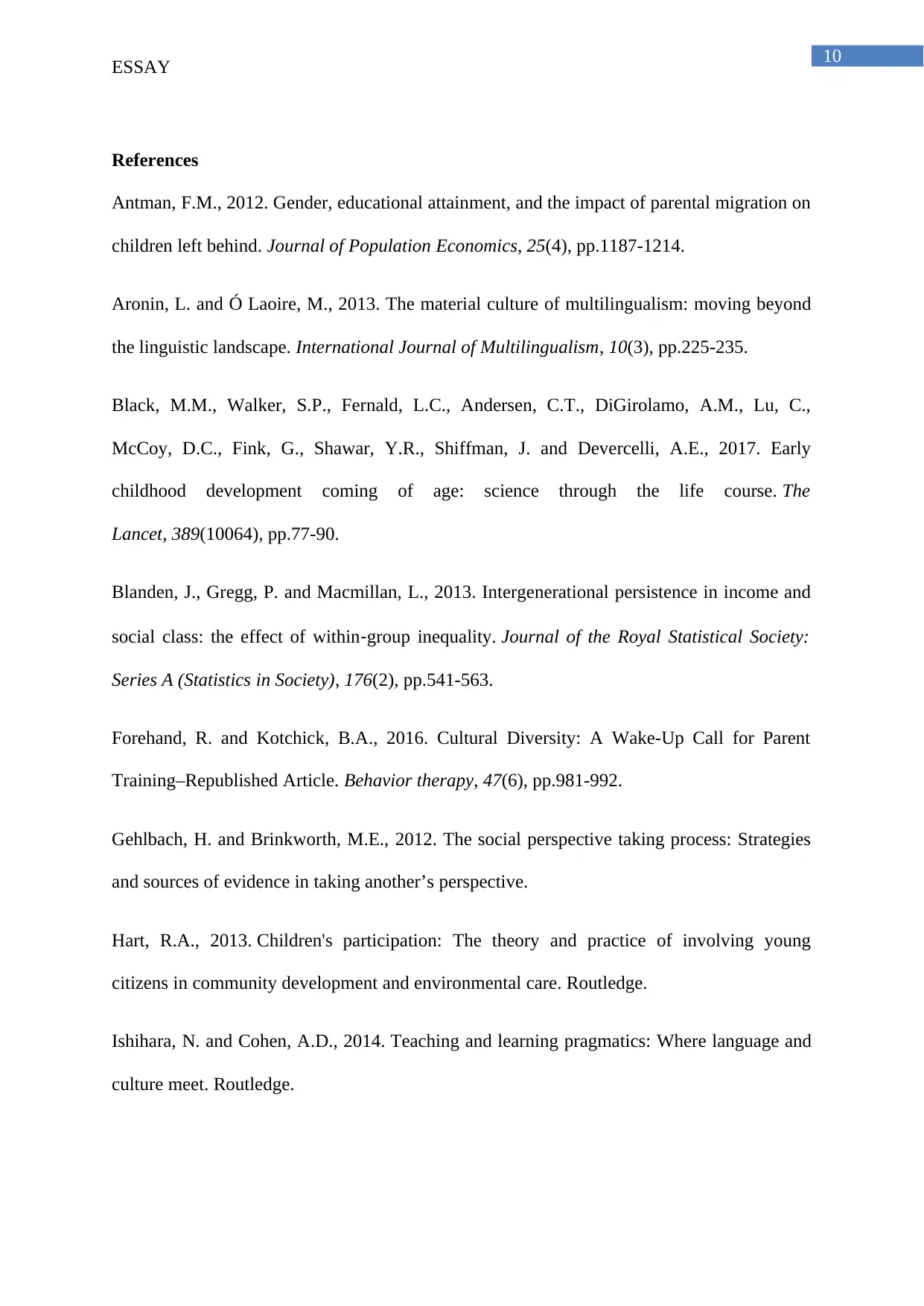
10
ESSAY
References
Antman, F.M., 2012. Gender, educational attainment, and the impact of parental migration on
children left behind. Journal of Population Economics, 25(4), pp.1187-1214.
Aronin, L. and Ó Laoire, M., 2013. The material culture of multilingualism: moving beyond
the linguistic landscape. International Journal of Multilingualism, 10(3), pp.225-235.
Black, M.M., Walker, S.P., Fernald, L.C., Andersen, C.T., DiGirolamo, A.M., Lu, C.,
McCoy, D.C., Fink, G., Shawar, Y.R., Shiffman, J. and Devercelli, A.E., 2017. Early
childhood development coming of age: science through the life course. The
Lancet, 389(10064), pp.77-90.
Blanden, J., Gregg, P. and Macmillan, L., 2013. Intergenerational persistence in income and
social class: the effect of within‐group inequality. Journal of the Royal Statistical Society:
Series A (Statistics in Society), 176(2), pp.541-563.
Forehand, R. and Kotchick, B.A., 2016. Cultural Diversity: A Wake-Up Call for Parent
Training–Republished Article. Behavior therapy, 47(6), pp.981-992.
Gehlbach, H. and Brinkworth, M.E., 2012. The social perspective taking process: Strategies
and sources of evidence in taking another’s perspective.
Hart, R.A., 2013. Children's participation: The theory and practice of involving young
citizens in community development and environmental care. Routledge.
Ishihara, N. and Cohen, A.D., 2014. Teaching and learning pragmatics: Where language and
culture meet. Routledge.
ESSAY
References
Antman, F.M., 2012. Gender, educational attainment, and the impact of parental migration on
children left behind. Journal of Population Economics, 25(4), pp.1187-1214.
Aronin, L. and Ó Laoire, M., 2013. The material culture of multilingualism: moving beyond
the linguistic landscape. International Journal of Multilingualism, 10(3), pp.225-235.
Black, M.M., Walker, S.P., Fernald, L.C., Andersen, C.T., DiGirolamo, A.M., Lu, C.,
McCoy, D.C., Fink, G., Shawar, Y.R., Shiffman, J. and Devercelli, A.E., 2017. Early
childhood development coming of age: science through the life course. The
Lancet, 389(10064), pp.77-90.
Blanden, J., Gregg, P. and Macmillan, L., 2013. Intergenerational persistence in income and
social class: the effect of within‐group inequality. Journal of the Royal Statistical Society:
Series A (Statistics in Society), 176(2), pp.541-563.
Forehand, R. and Kotchick, B.A., 2016. Cultural Diversity: A Wake-Up Call for Parent
Training–Republished Article. Behavior therapy, 47(6), pp.981-992.
Gehlbach, H. and Brinkworth, M.E., 2012. The social perspective taking process: Strategies
and sources of evidence in taking another’s perspective.
Hart, R.A., 2013. Children's participation: The theory and practice of involving young
citizens in community development and environmental care. Routledge.
Ishihara, N. and Cohen, A.D., 2014. Teaching and learning pragmatics: Where language and
culture meet. Routledge.
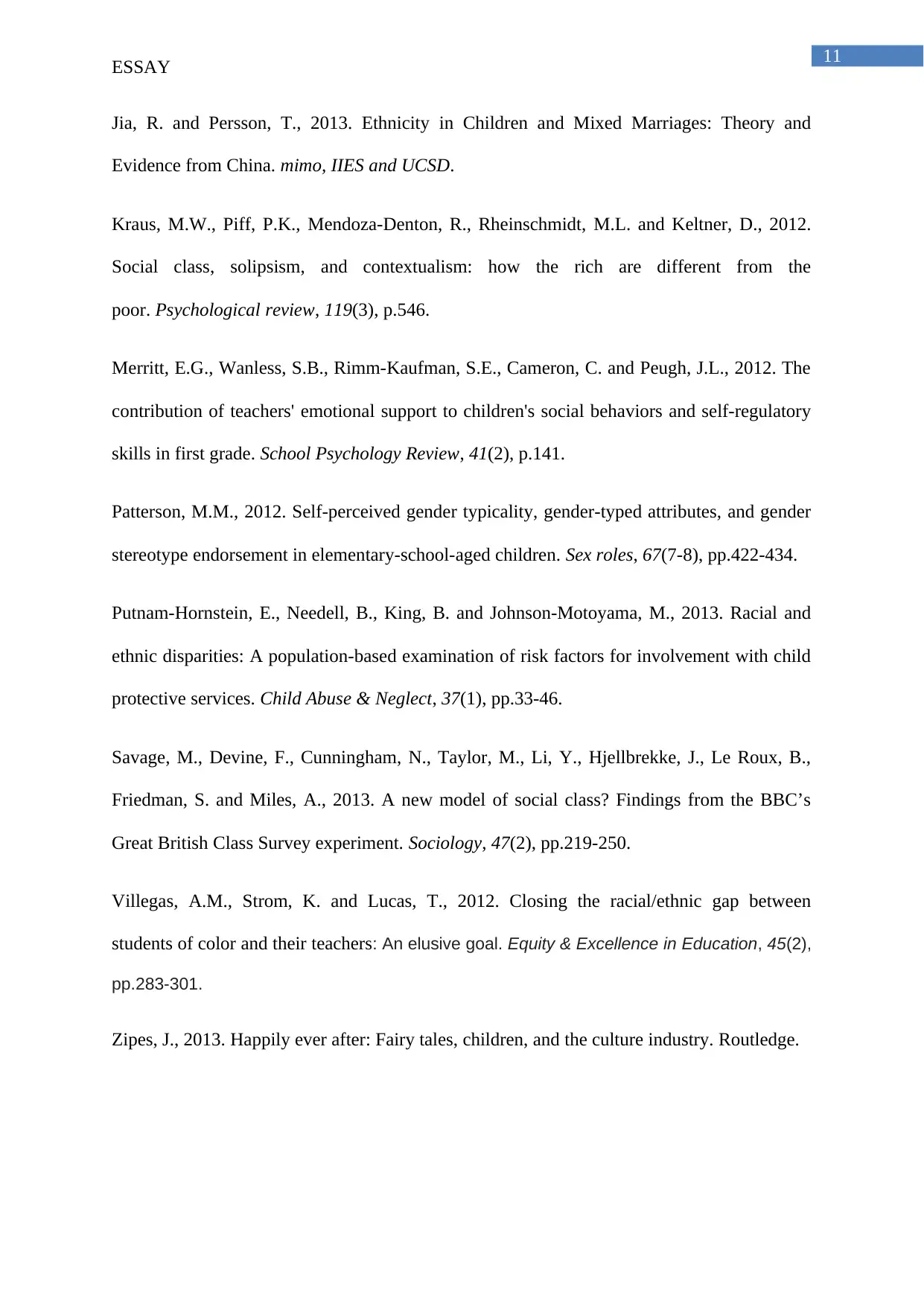
11
ESSAY
Jia, R. and Persson, T., 2013. Ethnicity in Children and Mixed Marriages: Theory and
Evidence from China. mimo, IIES and UCSD.
Kraus, M.W., Piff, P.K., Mendoza-Denton, R., Rheinschmidt, M.L. and Keltner, D., 2012.
Social class, solipsism, and contextualism: how the rich are different from the
poor. Psychological review, 119(3), p.546.
Merritt, E.G., Wanless, S.B., Rimm-Kaufman, S.E., Cameron, C. and Peugh, J.L., 2012. The
contribution of teachers' emotional support to children's social behaviors and self-regulatory
skills in first grade. School Psychology Review, 41(2), p.141.
Patterson, M.M., 2012. Self-perceived gender typicality, gender-typed attributes, and gender
stereotype endorsement in elementary-school-aged children. Sex roles, 67(7-8), pp.422-434.
Putnam-Hornstein, E., Needell, B., King, B. and Johnson-Motoyama, M., 2013. Racial and
ethnic disparities: A population-based examination of risk factors for involvement with child
protective services. Child Abuse & Neglect, 37(1), pp.33-46.
Savage, M., Devine, F., Cunningham, N., Taylor, M., Li, Y., Hjellbrekke, J., Le Roux, B.,
Friedman, S. and Miles, A., 2013. A new model of social class? Findings from the BBC’s
Great British Class Survey experiment. Sociology, 47(2), pp.219-250.
Villegas, A.M., Strom, K. and Lucas, T., 2012. Closing the racial/ethnic gap between
students of color and their teachers: An elusive goal. Equity & Excellence in Education, 45(2),
pp.283-301.
Zipes, J., 2013. Happily ever after: Fairy tales, children, and the culture industry. Routledge.
ESSAY
Jia, R. and Persson, T., 2013. Ethnicity in Children and Mixed Marriages: Theory and
Evidence from China. mimo, IIES and UCSD.
Kraus, M.W., Piff, P.K., Mendoza-Denton, R., Rheinschmidt, M.L. and Keltner, D., 2012.
Social class, solipsism, and contextualism: how the rich are different from the
poor. Psychological review, 119(3), p.546.
Merritt, E.G., Wanless, S.B., Rimm-Kaufman, S.E., Cameron, C. and Peugh, J.L., 2012. The
contribution of teachers' emotional support to children's social behaviors and self-regulatory
skills in first grade. School Psychology Review, 41(2), p.141.
Patterson, M.M., 2012. Self-perceived gender typicality, gender-typed attributes, and gender
stereotype endorsement in elementary-school-aged children. Sex roles, 67(7-8), pp.422-434.
Putnam-Hornstein, E., Needell, B., King, B. and Johnson-Motoyama, M., 2013. Racial and
ethnic disparities: A population-based examination of risk factors for involvement with child
protective services. Child Abuse & Neglect, 37(1), pp.33-46.
Savage, M., Devine, F., Cunningham, N., Taylor, M., Li, Y., Hjellbrekke, J., Le Roux, B.,
Friedman, S. and Miles, A., 2013. A new model of social class? Findings from the BBC’s
Great British Class Survey experiment. Sociology, 47(2), pp.219-250.
Villegas, A.M., Strom, K. and Lucas, T., 2012. Closing the racial/ethnic gap between
students of color and their teachers: An elusive goal. Equity & Excellence in Education, 45(2),
pp.283-301.
Zipes, J., 2013. Happily ever after: Fairy tales, children, and the culture industry. Routledge.
⊘ This is a preview!⊘
Do you want full access?
Subscribe today to unlock all pages.

Trusted by 1+ million students worldwide
1 out of 12
Related Documents
Your All-in-One AI-Powered Toolkit for Academic Success.
+13062052269
info@desklib.com
Available 24*7 on WhatsApp / Email
![[object Object]](/_next/static/media/star-bottom.7253800d.svg)
Unlock your academic potential
Copyright © 2020–2026 A2Z Services. All Rights Reserved. Developed and managed by ZUCOL.





